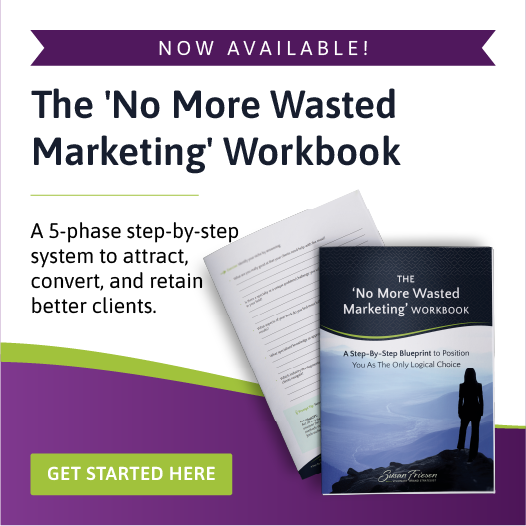I can vividly recall one Christmas Eve, over 20 years ago, when Daniel and I were neck-deep in debt, living off of credit cards, and trying desperately to keep eVision Media alive.
I’ll never forget standing at the grocery store checkout, anxiously praying that our credit card wouldn’t be declined as we paid for our tiny turkey dinner.
Over two decades later, this memory provides some pretty poignant perspective.
But back then, that gut-wrenching moment inspired us to make a promise to ourselves that we’d never be in that situation again.
So, if you’ve got the business blues right now, I totally get it.
There’s a lot of uncertainty in the world, the economy in most places is not good, and most of us are doing whatever we can to guard our wallets and avoid spending any money.
But if you choose to stop marketing during tough times, it might actually be one of the worst moves you could ever make.
Sure, cutting your marketing budget may seem like an easy fix if you’re strapped for cash, but in my experience, it’s the wrong thing to do.
Even when we were drowning in debt, we didn’t stop our marketing efforts. And if we had, it could have been the end of eVision Media.
Because at the end of the day, marketing shouldn’t be seen as just an expense, but rather, an investment in your visibility and credibility.
Think about it: If people can’t see you, then how can you expect them to trust you or want to buy anything from you?
What’s more, many marketers believe marketing during tough times offers unique opportunities, as other companies pull back on their efforts and become less visible.
For instance, a survey from R.R. Donnelley, which polled 300 marketers in the U.S., found that nearly three-quarters of respondents believe a recession or economic downturn provides a “strategic opportunity to gain market share”.
That being said, instead of cutting your marketing budget, it’s probably better to pivot and refocus.
So, if you want to know what happens when you cut your marketing budget, or you just want to learn how to market your business during a downturn, this is an article you can’t afford to miss.
Why You Should Continue Marketing During Tough Times
When the economy dips and uncertainty rises, many business owners feel the urge to cut expenses – and marketing is often one of the first things on the chopping block.
But marketing in an economic downturn is not just some optional luxury. It’s a vital strategy that helps your business stay visible, build trust, and prepare for future growth.
And while it can be tempting to pull back when the going gets tough, cutting your marketing budget is rarely the answer.
With that in mind, here’s why you should continue marketing during tough times:
Cutting Your Marketing Budget Can Cost You More in the Long Run
When you stop marketing, your visibility starts to fade, and out of sight often means out of mind, which can be hard to recover from once things improve.
And if your competitors are still marketing while you’re not, they’re more likely to capture the attention – and dollars – of your target audience.
In any case, staying consistent when it comes to your marketing helps reinforce your brand’s presence and builds credibility in the eyes of your audience.
Ultimately, marketing in a bad economy is about keeping your business top-of-mind so customers will remember you when they’re ready to buy again.
It’s Not About Spending More – It’s About Spending Smarter
Continuing your marketing efforts doesn’t have to mean blowing your budget.
In fact, tough times are the perfect opportunity to get strategic and focus on what really works.
In doing so, you should shift your efforts toward whatever marketing channels provide the best return on investment.
You can also use this time to refine your messaging by speaking directly to the challenges your customers are facing and highlighting how your product or service can help.
And when you continue marketing in a bad economy, it helps to build trust by showing your audience that you’re here to support them, even when things get tough.
A Strong Marketing Presence Shows Stability
In uncertain times, people want to buy from businesses they know they can rely on.
And if your brand disappears the moment things get tough, it sends the message that your business may not be around for long.
On the other hand, a consistent and visible marketing presence signals confidence and resilience, which shows your audience that you’re in it for the long haul.
Moreover, this kind of reassurance can inspire loyalty and make customers feel more secure about doing business with you.
You’ll Be Ready When the Market Bounces Back
Tough times don’t last forever. And when the economy turns around, businesses that continued marketing will already be positioned to thrive.
They’ll have a stronger presence, more engaged customers, and a clearer message, while others will be scrambling to catch up.
So, if you continue marketing in an economic downturn, you’re laying the foundation for future growth, and preparing to lead the way when things improve.
Read: The Benefits of Brand Positioning for Small Businesses

No matter what kind of business you own, or what the economic conditions are currently, understanding your brand positioning is one of the best things you can do for your marketing.
And while you might think this is just some kind of marketing jargon, the truth is, properly positioning your brand offers one of the best ways to ensure it’ll stand out and get noticed.
With that in mind, this article explains what brand positioning is, why it’s so important, and how it can benefit small businesses like yours.
Smart Strategies for Marketing During Tough Times
While many business owners try to avoid it, marketing during tough times is absolutely essential.
Because the businesses that keep showing up, staying consistent, and focusing on delivering real value will be the ones customers remember when the dust settles.
With that in mind, let’s explore 11 smart strategies to help you keep your brand strong, visible, and thriving – no matter what the economy throws your way.
1) Boost Customer Loyalty by Showing You Care
During challenging economic times, your current customers are one of your greatest assets.
They already know and love what you do, so deepening those relationships should be a top priority.
Sure, everyone wants to attract new leads, but when times are tough, it’s more important to nurture the ones you’ve already earned.
So, make sure to reach out with genuine appreciation and let them know that they matter.
Whether it’s highlighting a customer success story on social media or offering a surprise loyalty perk, these thoughtful gestures go a long way.
Even a simple, handwritten thank-you note can strengthen the emotional connection customers feel with your brand.
And the more valued they feel, the more likely they’ll be to stick with you and refer others along the way.
2) Steal the Spotlight with Strategic Publicity
When times are tough, getting noticed can be even harder, but that just makes the publicity that much more valuable.
So, when you’re marketing during tough times, don’t wait for the media to find you.
Share your positive impact through press releases, offer your expertise to journalists covering industry trends, or get involved in local events.
In addition, community initiatives, sponsorships, or even charitable efforts tied to your mission can generate goodwill and powerful word-of-mouth.
And this kind of strategic publicity isn’t about bragging – it’s about building credibility when it matters most.
3) Reignite Your Professional Network
Marketing during tough times can be as much about relationships as it is about campaigns.
And your brand presence strengthens not just through new connections, but through the trust and goodwill you rebuild with those who already know your value.
So, when you’re in an economic slowdown, it’s the perfect time to reconnect with former colleagues, past clients, and industry peers, attend local events, join online forums, or engage with potential prospects on LinkedIn.
It’s also important to do things that invite conversation, like offering help where you can, and sharing valuable insights, as this keeps you top-of-mind when opportunities arise.
4) Stay in Front with Strategic Emails
Email remains one of the most powerful tools in your marketing toolkit, and this is no less true during an economic downturn.
A consistent email strategy helps reinforce trust and keeps your brand close, even when customers aren’t ready to buy just yet.
Among other benefits, email allows for direct, consistent communication with your audience, and it’s a great way to remain visible without draining your budget.
You can use newsletters or automated email campaigns to share valuable tips, behind-the-scenes updates, or time-sensitive offers to make sure your audience knows you’re still around and ready to serve them.
5) Refine Your Website Through Analytics
Your website should always be working for you – especially when budgets are tight.
So, when you’re marketing during tough times, this should include a deep dive into what’s working on your website, and what’s not.
Which pages are getting the most traffic? And where are people dropping off?
Once you’ve figured this out, you can then use these insights to adjust your content, highlight bestsellers, or add new offers that speak more to the current needs of your customers.
Luckily, optimizing your site doesn’t necessarily require a full overhaul, and small tweaks to your layout, messaging, or calls to action can have a big impact.
In any case, when your website is clear, relevant, and easy to navigate, it becomes a powerful silent salesperson that works around the clock, regardless of economic conditions.
6) Blog With Purpose
Your blog is more than a place to post updates – it’s your platform for providing expertise and information that’s relevant to your audience.
That being said, marketing during tough times calls for valuable, relevant content that addresses your audience’s real-world concerns.
So, instead of publishing just to stay active, make sure to write with purpose.
Create articles that solve problems, answer common questions, or offer fresh insight into your industry or how you can help potential customers.
This kind of strategic blogging not only helps to improve your SEO, but also helps you build authority and trust, which is exactly what people are looking for when money is tight.
7) Bring Back Winning Promotions
Just because a promotion is old doesn’t mean it’s no longer useful, and if something worked well in the past, you may want to try giving it new life.
So, when you’re marketing in an economic downturn, try leaning into what already resonates.
Look at your most successful campaigns and think about how you can tweak the messaging to fit today’s climate.
Whether it’s a limited-time offer or a nostalgic relaunch of a fan favourite, you don’t need to reinvent the wheel when you can just put a new spin on it.
8) Partner Up for Extra Exposure
Partnerships are a smart way to expand your reach without multiplying your efforts, which makes them great when you’re marketing during tough times.
Having said that, you should work with like-minded businesses that complement – not compete with – what you have to offer.
In any case, cross-promoting products, co-hosting events, or running joint giveaways can double your exposure while helping you build relationships with new customers.
And when you team up with the right partner, you’ll both gain access to wider audiences and build credibility through association.
9) Maximize Your Social Media Impact
Social media isn’t just about posting – it’s about telling your brand story in a way that connects.
And this is even more important when economic conditions are tough.
So, instead of focusing only on promotions, products, or services, you should try sharing stories that humanize your business.
Video content, behind-the-scenes clips, and thoughtful commentary on trending topics can make your business more relatable by, for instance, showcasing your processes, and highlighting the real people behind your brand.
But no matter what you choose to post, the more genuine and engaging your social presence is, the more likely people will be to remember your brand, and choose to do business with you.
10) Know When to Outsource
You wear a lot of hats as a business owner but trying to do everything yourself can stall your momentum, and this is especially true when you’re marketing during tough times.
What you should do instead is focus on what you do best and then seek support in areas where your skills may be lacking.
For example, if you’re not the best at these things, hiring professionals for content creation, social media management, or SEO optimization can help elevate your brand’s polish and performance.
At any rate, investing wisely in the right help allows you to save a ton of time, reduce stress, and improve your results.
11) Stay Financially Savvy as You Grow
Just because you’re marketing during tough times doesn’t mean you can’t think creatively about revenue.
So, you might want to consider offering part-time consulting services, launching a small digital product, or exploring passive income streams that align with your expertise.
Smart, sustainable growth means staying flexible and looking for ways to generate income while continuing to build your brand.
The goal is to stay visible and valuable – without burning out or overextending.
Not sure which marketing strategy is best for your business? Why not set up a free 30-minute consultation with me to find out how we can help?
To your business success,
Susan Friesen
P.S. If you liked the article, you might want to subscribe to our newsletter. We publish tons of valuable content to help you learn more about marketing, and subscribing is the best way to ensure you don’t miss out. Additionally, if you’d like to learn more about building a search engine optimized website, click here for our free website guide.







